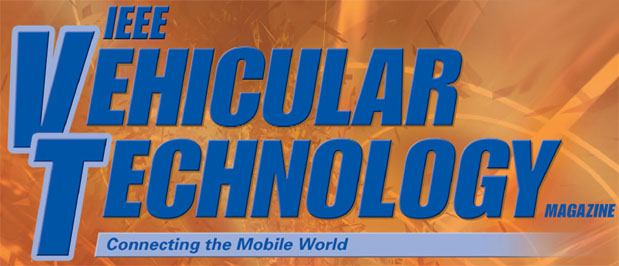Call For Papers:
IEEE VT Magazine Special Issue on Recent Advances in Motion Control, Estimation and Diagnosis for Automated Vehicles
Important Dates |
|
|---|---|
| Manuscript Submission EXTENDED: | 1 December 2020 |
| First Round Reviews by: | 12 February 2021 |
| Second Round Submissions by: | 29 March 2021 |
| Second and Final Round Reviews: | 15 May 2021 |
| Authors submit final articles: | 25 May 2021 |
| Publication: September 2021 | |
The vehicle of the future is expected to be automated. High levels of vehicle automation are seen as enabling technologies to improve road safety--more than 90% of today’s car crashes are still due to human errors--road utilization and reduce air pollutant emissions. However, to make this happen, research communities still need to address several challenges. Vehicle automation requires information about the surrounding environment, road conditions and vehicle states, which is difficult to accurately sense. This uncertain information creates challenges for safe and reliable decision making and control of the vehicle, as well as for testing and validation. Additionally, with the increase in vehicle automation the rate of utilization is expected to grow significantly - think of self-driving taxis or trucks operating 24/7. This will raise the vehicle’s reliability demands, requiring timely diagnosis of faults, as well as effective mitigation strategies for fault-tolerant operation. This Special Issue encourages researchers working in this field to share their latest developments on control, estimation and diagnosis functions relevant for vehicle automation. The topics of interest include, but are not limited to:
- Motion control algorithms, including advanced control and decision-making strategies for longitudinal, lateral and vertical vehicle dynamics
- Frameworks for road state estimation, such as road height irregularities, slope, bank angle or grip levels between tyre and road, which are instrumental to autonomously operative vehicles at the limit of adhesion, as well as vehicle and tires state estimation, including position, velocity and orientation
- Diagnosis and fault estimation of safety-critical vehicular sub-systems, actuators and sensors, as well as digital twins to support and improve lifetime diagnosis functions
- Distributed electrical propulsion architectures, e.g. with in-wheel motors and by-wire actuation, as a mean to enhance vehicle controllability and fault-tolerance operation
- Exploitation of connectivity with other vehicles and infrastructure in the design of vehicular control and estimation functions
- Modelling and simulation methods to accelerate and improve the development of vehicle automation functions, including virtual and experimental testing techniques and implementations in embedded systems
- Standardization opportunities in vehicle automation, including analysis of existing standards and discussion of future standardization needs, such as safety metrics of automated vehicles
- Application use cases in road and off-road vehicles, e-bikes, motorcycles, buses, trucks, etc.
Submitted papers should contain state-of-the-art research or technical material presented in a tutorial or survey style. All manuscripts must adhere to the IEEE VTM guidelines. Authors should submit a PDF version of their manuscript to ScholarOne Manuscripts™ (select Special Issue)
Guest Editors
Dr. Ricardo de Castro, German Aerospace Center (DLR), Germany
Prof. Basilio Lenzo, Sheffield Hallam University, United Kingdom
Prof. Yan Chen, Arizona State University, USA
Dr. Shaobing Xu, University of Michigan, Ann Arbor, USA
Prof. Shengbo Eben Li, Tsinghua University, China

